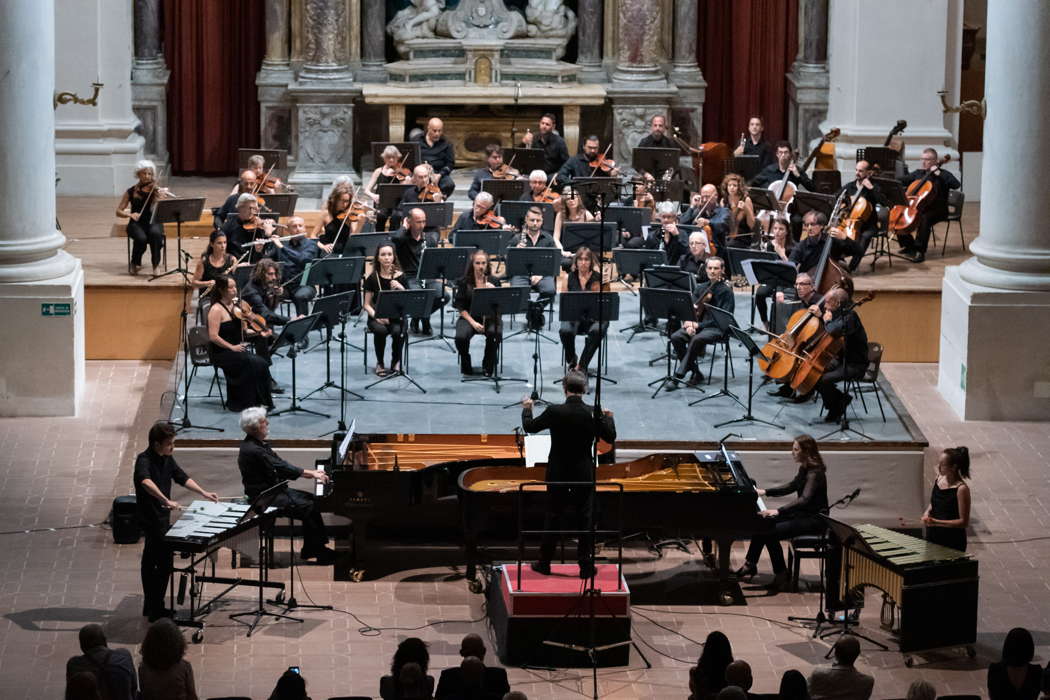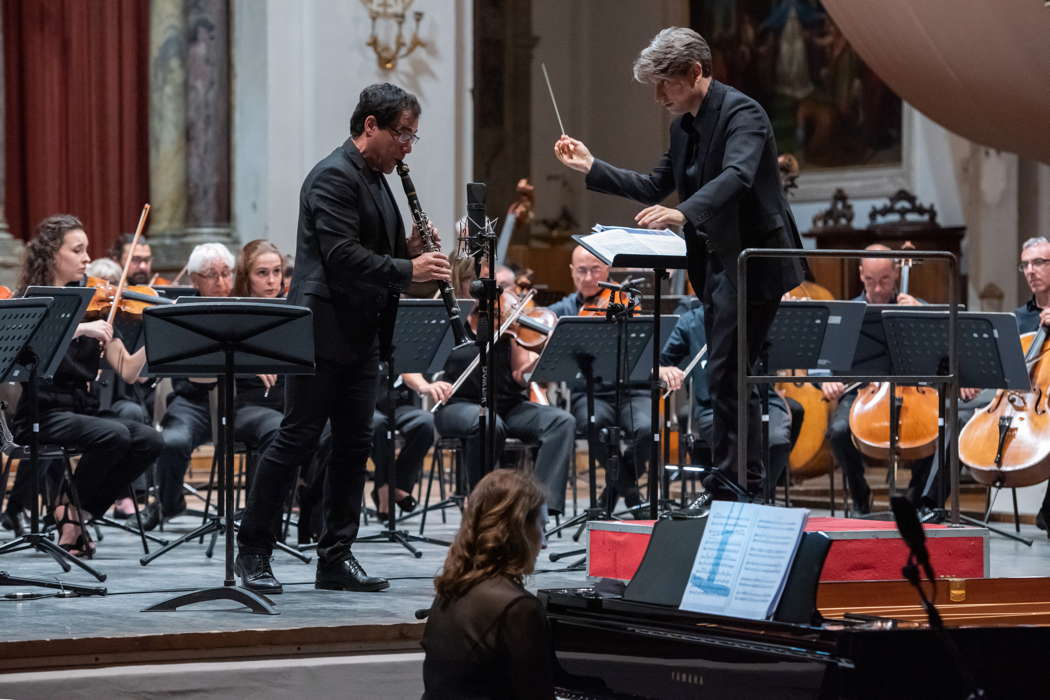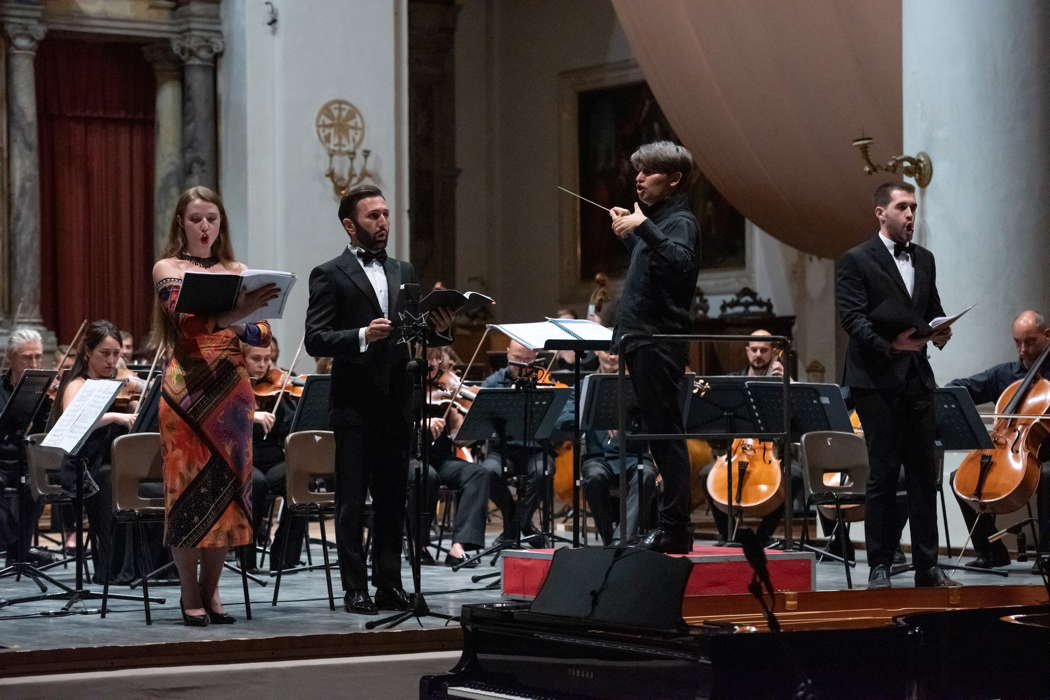 CENTRAL ENGLAND: Mike Wheeler's concert reviews from Nottingham and Derbyshire feature high profile artists on the UK circuit - often quite early on their tours.
CENTRAL ENGLAND: Mike Wheeler's concert reviews from Nottingham and Derbyshire feature high profile artists on the UK circuit - often quite early on their tours.
The Seven Year Itch
GIUSEPPE PENNISI visits the Chigiana International Festival and Summer Academy
The Chigiana International Festival and Summer Academy is at its seventh year itch. It is a good itch. The 'young' Siena Festival, built on the experiences of the Chigiana Weeks, a short but important festival that started in the nineteen thirties, has become, with the Ravenna Festival, which has turned thirty-two years old this year, one of the two most interesting and stimulating musical events of the summer in Italy.
As described here on 10 June 2021, Ravenna is a multidisciplinary festival in two tracks, one long summer festival and one shorter autumn festival, dedicated essentially to opera and musical theatre. At the Chigiana Festival, there is only music, mostly contemporary or great shots of the past. In Siena, the curtain is raised sixty times. In Ravenna one hundred and forty times. They are both thematic. The Ravenna Festival 2021 is dedicated to Dante. That of Siena to the diversity of musical expressions, with great emphasis, however, on modern and contemporary composers. They both have strong local support and a good international audience too: Ravenna, as mentioned several times in this magazine, has become Salzburg on the Adriatic coastline. Siena relies not only on a strong presence of local audience but also of foreigners living (or having secondary residences) in the nearby area and on cultural tourism, now coming back after the COVID-19 pandemic.
The core of the Chigiana International Festival and Summer Academy 2021 is the American music of the second half of the twentieth century and the beginning of this century, with many rarities (as befits a festival) ie first international or Italian performances of recent compositions. Within this great attention to contemporary American music, there is a focus on Steve Reich. There is a significant women's presence: twenty women between ensemble conductors and composers, an operatic staging - Rossini's L'occasione fa il ladro and a children's opera in semi-scenic form - The New Adventures of Babar by Francis Poulenc and Fred Onovwerosuoke. At the Festival, contemporary and modern music alternate with chamber concerts of classical music, in which participants in the master classes are largely protagonists; these concerts are held in the main hall of Palazzo Chigi Saraceni or in other suggestive places in the province.
I was at the opening evening on 5 July 2021 in the elegant Vanvitellian auditorium built in a former Church. The auditorium was full (within the limits of the restrictions due to the health emergency) of both Siena citizens and foreigners (partly resident in Tuscany). The program was conceived as a starter for the rest of the Festival. It included the first Italian performance of a recent work, Reich's 2018 Music for Ensemble and Orchestra, followed by a Copland classic - the Clarinet Concerto of 1948, best known for the ballet version, choreographed in 1951 by Jerome Robbins - and a tribute to Stravinsky in the fiftieth anniversary year of his death, choosing one of the works of his neoclassical period, Pulcinella. Before the concert, the chorus did not miss a tribute to Josquin des Prez, of whom six hundred years recur since his death; the chorus intoned his Ave Maria in a gathering at the Palazzo Chigi Saraceni courtyard that preceded the actual inauguration of the festival.
The complex concert program required, in addition to a large symphony orchestra, for Reich's piece the presence of the Chigiana Keyboard Ensemble - Luigi Pecchia and Monica Cattarossi - and the Chigiana Percussion Ensemble - Alessio Cavaliere and Emanuela Olivelli - as well as Giuseppe Ettorre on double bass and Franco Fabbrini on electric bass. Copland's work was composed at the suggestion of Benny Goodman; it involved an internationally renowned clarinettist, Alessandro Carbonare. Stravinsky's ballet was performed in the full version staged in Paris in 1920; thus, with a soprano, Ornella De Lucca, a tenor, Pasquale Scircoli, and a bass Gianandrea Navacchia. In short, it involved a great production effort.
Reich's Music for Ensemble and Orchestra is a modern version of what used to be the Baroque concerto grosso: twenty soloists, strings, wind, two vibraphones and two pianos. Reich himself claims to have been inspired by Bach's Fifth Brandenburg Concerto, reread, however, with the style of American minimalism of the late last century and the beginning of this century. The electric bass bears an echo of rock and roll and the percussion sensations are more Mediterranean (almost Middle Eastern) than American. The diminuendo, leading gently to the finale, was very good. Conductor Daniele Rustioni, the orchestra and the groups of soloists showed great skill.

A scene from the opening concert of the Chigiana Festival. Photo © 2021 Roberto Testi
Copland's Clarinet Concerto is quite different. There is the legacy of Litvak, that is, of Lithuanian Jewish culture (which united him with Goodman) and above all the jazz influence and euphoria of the years after World War II.

Alessando Carbonare playing Copland's Clarinet Concerto with conductor Daniele Rustioni and members of the Orchestra della Toscana at the Chigiana Festival. Photo © 2021 Roberto Testi
It is an overwhelming dialogue between clarinet and orchestra, so exciting that the enthusiastic audience asked Alessando Carbonare for an encore, to which he responded with a soloist's virtuoso piece by Gaspare Tirincanti - Clarinettologia.
From American music of the twentieth century, the concert moved on to the Parisian Stravinsky of the twenties. Pulcinella - as is known - is a reworking, by the Russian-born composer (but later naturalized, first French and then American), of unfinished manuscripts by Pergolesi, found by chance by Sergei Diaghielev in the library of the Conservatory of Naples. There are several versions of the work, including the stage version with Léonide Massine's choreography and sets and costumes by Pablo Picasso. Unlike the later versions - suites, pianos - the original score that triumphed at the Paris Opéra involves characters and voices. The orchestra conducted by Rustioni performed well. The voices are well set, but the tenor's is a little small.

Ornella De Lucca, soprano, Pasquale Scircoli, tenor, Gianandrea Navacchia, bass, conductor Daniele Rustioni and orchestra performing Stravinsky's Pulcinella at the Chigiana Festival. Photo © 2021 Roberto Testi
I will probably return to the festival for two concerts of seldom performed music: one dedicated to Bohuslav Martinů, David Krakauer and Alexander von Zemlinsky, and the other dedicated to the most recent works by Steve Reich and Bruno Letort, in collaboration with the sound laboratory of Padua Conservatory.
Copyright © 8 July 2021
Giuseppe Pennisi,
Rome, Italy




